
RCBO's vs MCB's: Explained a few different ways...
RCBO's vs MCB's, whats the difference?

In simple terms;
RCBO (Residual Current Circuit Breaker with Overcurrent Protection):
- Nickname: The "Electricity Cop."
- What it does: RCBO's are like that superhero that watches over you and your electrical stuff. It makes sure gadgets don't blow up and keeps you safe from getting zapped.
- Why it's cool: It's like a double agent. It stops too much electricity (overload) and catches sneaky electricity that wants to go places it shouldn't (like the ground, or your finger).
RCBO's keep you safe from getting electrocuted!
MCB (Miniature Circuit Breaker):
- Nickname: The "Circuit Bouncer."
- What it does: MCB's are the bouncer at the electrical party. If things get wild and the wires start acting up, it steps in and kicks the troublemakers out. MCB's provide protection against overcurrents only.
- Why it's cool: It's simple but effective. It's like having a bouncer at the club who knows when to stop the party from getting out of hand.
MCB's do not protect against electric shock hazards directly.
So, in short, RCBO is like an electric superhero, doing double duty to keep you and your devices safe, while MCB is the no-nonsense bouncer at the electrical party, making sure things don't get too crazy. They're both there to keep your electrical system in check! 🦸♂️💥🚫
Shall we get a little more technical on the matter...?
An RCBO (Residual Current Circuit Breaker with Overcurrent Protection) and an MCB (Miniature Circuit Breaker) are both important electrical safety devices, but they serve different purposes and are not necessarily "better" or "worse" than each other. The choice between an RCBO and an MCB depends on the specific electrical installation and its requirements. Here's a comparison of the two:
-
Function:
- RCBO: An RCBO combines the functions of an MCB and an RCD (Residual Current Device). It provides overcurrent protection (like an MCB) and detects residual current imbalances, such as those caused by electrical faults or leakage to ground. It trips the circuit if it detects a fault to protect against both overcurrent and electric shock hazards.
- MCB: An MCB, on the other hand, provides overcurrent protection only. It is designed to protect against excessive current flow in a circuit, such as during a short circuit or overload, but it does not detect residual current imbalances.
-
Protection Level:
- RCBO: Offers both overcurrent protection and protection against electric shock hazards due to ground faults, making it more comprehensive in terms of safety.
- MCB: Provides protection against overcurrents only and does not protect against electric shock hazards directly.
-
Use Cases:
- RCBO: Typically used in applications where both overcurrent protection and protection against electric shock hazards are required. Commonly used in residential and commercial installations, especially in areas where water is present, like kitchens and bathrooms.
- MCB: Used in situations where only overcurrent protection is needed, such as protecting circuits from short circuits and overloads in lighting and power circuits.
-
Cost and Complexity:
- RCBO: Generally more expensive and complex than MCBs due to its dual functionality.
- MCB: Typically more cost-effective and simpler in design since it only provides overcurrent protection.
-
Sensitivity:
- RCBO: Can be adjusted for sensitivity to detect smaller ground fault currents, making it more suitable for applications where high sensitivity is required.
- MCB: Does not have sensitivity adjustments for ground fault currents.
In summary, whether an RCBO is better than an MCB depends on the specific electrical installation and safety requirements. RCBOs are favored when both overcurrent protection and protection against electric shock hazards are necessary, like in domestic environments. While MCBs are used when only overcurrent protection is required.
It's important to follow local electrical codes and consult with a qualified electrician to determine the appropriate protection devices for a given electrical system.
Alright, mate, let's break it down in some proper Cockney slang for ya:
RCBO (Residual Current Circuit Breaker with Overcurrent Protection):
- Nickname: The "Zap 'n' Stop."
- What it does: This one's like your electric bodyguard, innit? It makes sure your power ain't gone bonkers and keeps ya from gettin' a nasty shock.
- Why it's bangin': It's like a two-for-one deal, stops too much juice (overload) and nabs any dodgy currents lookin' for trouble.
MCB (Miniature Circuit Breaker):
- Nickname: The "Circuit Flicker."
- What it does: This fella's the gatekeeper at the electrical boozer. When the wires start actin' all rowdy, it steps in and kicks the ruckus out.
- Why it's the business: It's simple and does the job, like a proper bouncer at a boozer, keepin' things in line.
So there ya have it, mate. The RCBO's your electric bodyguard, and the MCB's the gatekeeper at the electrical pub, makin' sure things don't get too messy, know what I mean? 🇬🇧💂♂️⚡️🍻
In case you were wondering, or even if you werent, this was actually all AI generated content as a test of chatgpt.com.

Here at westbasedirect.com, we stock an extensive range of RCBO's and MCB's, including Single and Three Phase options from leading brands such as:
- Hager 6kA RCBO's
- Hager 10kA RCBO's
- Hager 6kA MCB's
- Hager 10kA MCB's
- Schneider Easy9 6kA RCBO's
- Schneider Easy9 6kA MCB's
- Schneider KQ 10kA RCBO's (formerly Square-D)
- Schneider KQ 10kA MCBs (formerly Square-D)
- FuseBox 6kA RCBO's
- FuseBox 6kA Mini-RCBO's
- FuseBox 6kA MCB Devices
- FuseBox 10kA RCBO's
- FuseBox 10kA MCB's
- BG Electrical RCBO Devices
- Click Elucian 6kA RCBO's
Contact us directly for your Domestic or Commercial electrical installations and projects, we are please tto support local traders, councils, end-users and government bodies.
Energizer A-Rated Bulbs

Energizer S29628 A Rated LED Elite GLS E27 Filament 806lm 3.8W 2700K (Warm White)
Energizer S29628 A Rated LED Elite GLS E27 Filament 806lm 3.8W 2700K (Warm White) Energizer products are recognised as one of the most trusted and ...
View full details
Energizer S29628 A Rated LED Elite GLS E27 Filament 806lm 3.8W 2700K (Warm White)(12 Pack)
Energizer S29628 A Rated LED Elite GLS E27 Filament 806lm 3.8W 2700K (Warm White)(12 Pack) Energizer products are recognised as one of the most tru...
View full details
Energizer S29629 A Rated LED Elite GLS E27 Filament 806lm 3.8W 6500K (Daylight)
Energizer S29629 A Rated LED Elite GLS E27 Filament 806lm 3.8W 6500K (Daylight) Energizer products are recognised as one of the most trusted and hi...
View full details
Energizer S29629 A Rated LED Elite GLS E27 Filament 806lm 3.8W 6500K (Daylight)(12 Pack)
Energizer S29629 A Rated LED Elite GLS E27 Filament 806lm 3.8W 6500K (Daylight)(12 Pack) Energizer products are recognised as one of the most trust...
View full details
Energizer S29630 A Rated LED Elite GLS B22 Filament 806lm 3.8W 2700K (Warm White)
Energizer S29630 A Rated LED Elite GLS B22 Filament 806lm 3.8W 2700K (Warm White) Energizer products are recognised as one of the most trusted and ...
View full details
Energizer S29630 A Rated LED Elite GLS B22 Filament 806lm 3.8W 2700K (Warm White)(12 Pack)
Energizer S29630 A Rated LED Elite GLS B22 Filament 806lm 3.8W 2700K (Warm White)(12 Pack) Energizer products are recognised as one of the most tru...
View full details
Energizer S29631 A Rated LED Elite GLS B22 Filament 806lm 3.8W 6500K (Daylight)
Energizer S29631 A Rated LED Elite GLS B22 Filament 806lm 3.8W 6500K (Daylight) Energizer products are recognised as one of the most trusted and hi...
View full details
Energizer S29631 A Rated LED Elite GLS B22 Filament 806lm 3.8W 6500K (Daylight)(12 Pack)
Energizer S29631 A Rated LED Elite GLS B22 Filament 806lm 3.8W 6500K (Daylight)(12 Pack) Energizer products are recognised as one of the most trust...
View full details
Energizer S29632 A Rated LED Elite GLS E27 Filament 1521lm 7.2W 2700K (Warm White)
Energizer S29632 A Rated LED Elite GLS E27 Filament 1521lm 7.2W 2700K (Warm White) Energizer products are recognised as one of the most trusted and...
View full details
Energizer S29632 A Rated LED Elite GLS E27 Filament 1521lm 7.2W 2700K (Warm White)(12 Pack)
Energizer S29632 A Rated LED Elite GLS E27 Filament 1521lm 7.2W 2700K (Warm White)(12 Pack) Energizer products are recognised as one of the most tr...
View full details
Energizer S29633 A Rated LED Elite GLS E27 Filament 1521lm 7.2W 6500K (Daylight)
Energizer S29633 A Rated LED Elite GLS E27 Filament 1521lm 7.2W 6500K (Daylight) Energizer products are recognised as one of the most trusted and h...
View full details
Energizer S29633 A Rated LED Elite GLS E27 Filament 1521lm 7.2W 6500K (Daylight)(12 Pack)
Energizer S29633 A Rated LED Elite GLS E27 Filament 1521lm 7.2W 6500K (Daylight)(12 Pack) Energizer products are recognised as one of the most trus...
View full details
Energizer S29634 A Rated LED Elite GLS B22 Filament 1521lm 7.2W 2700K (Warm White)
Energizer S29634 A Rated LED Elite GLS B22 Filament 1521lm 7.2W 2700K (Warm White) Energizer products are recognised as one of the most trusted and...
View full details
Energizer S29634 A Rated LED Elite GLS B22 Filament 1521lm 7.2W 2700K (Warm White)(12 Pack)
Energizer S29634 A Rated LED Elite GLS B22 Filament 1521lm 7.2W 2700K (Warm White)(12 Pack) Energizer products are recognised as one of the most tr...
View full details
Energizer S29635 A Rated LED Elite GLS B22 Filament 1521lm 7.2W 6500K (Warm White)
Energizer S29635 A Rated LED Elite GLS B22 Filament 1521lm 7.2W 6500K (Warm White) Energizer products are recognised as one of the most trusted and...
View full details
Energizer S29635 A Rated LED Elite GLS B22 Filament 1521lm 7.2W 6500K (Warm White)(12 Pack)
Energizer S29635 A Rated LED Elite GLS B22 Filament 1521lm 7.2W 6500K (Warm White)(12 Pack) Energizer products are recognised as one of the most tr...
View full details
Energizer S29636 A Rated LED Elite Candle E27 Filament 470lm 2.2W 2700K (Warm White)
Energizer S29636 A Rated LED Elite Candle E27 Filament 470lm 2.2W 2700K (Warm White) Energizer products are recognised as one of the most trusted a...
View full details
Energizer S29636 A Rated LED Elite Candle E27 Filament 470lm 2.2W 2700K (Warm White)(12 Pack)
Energizer S29636 A Rated LED Elite Candle E27 Filament 470lm 2.2W 2700K (Warm White)(12 Pack) Energizer products are recognised as one of the most ...
View full details
Energizer S29637 A Rated LED Elite Candle E27 Filament 470lm 2.2W 6500K (Daylight)
Energizer S29637 A Rated LED Elite Candle E27 Filament 470lm 2.2W 6500K (Daylight) Energizer products are recognised as one of the most trusted and...
View full details
Energizer S29637 A Rated LED Elite Candle E27 Filament 470lm 2.2W 6500K (Daylight)(12 Pack)
Energizer S29637 A Rated LED Elite Candle E27 Filament 470lm 2.2W 6500K (Daylight)(12 Pack) Energizer products are recognised as one of the most tr...
View full details
Energizer S29638 A Rated LED Elite Candle B22 Filament 470lm 2.2W 2700K (Warm White)
Energizer S29638 A Rated LED Elite Candle B22 Filament 470lm 2.2W 2700K (Warm White) Energizer products are recognised as one of the most trusted a...
View full details
Energizer S29638 A Rated LED Elite Candle B22 Filament 470lm 2.2W 2700K (Warm White)(12 Pack)
Energizer S29638 A Rated LED Elite Candle B22 Filament 470lm 2.2W 2700K (Warm White)(12 Pack) Energizer products are recognised as one of the most ...
View full details
Energizer S29639 A Rated LED Elite Candle B22 Filament 470lm 2.2W 6500K (Daylight)
Energizer S29639 A Rated LED Elite Candle B22 Filament 470lm 2.2W 6500K (Daylight) Energizer products are recognised as one of the most trusted and...
View full details
Energizer S29639 A Rated LED Elite Candle B22 Filament 470lm 2.2W 6500K (Daylight)(12 Pack)
Energizer S29639 A Rated LED Elite Candle B22 Filament 470lm 2.2W 6500K (Daylight)(12 Pack) Energizer products are recognised as one of the most tr...
View full details
Energizer S29640 A Rated LED Elite Candle E14 Filament 470lm 2.2W 2700K (Warm White)
Energizer S29640 A Rated LED Elite Candle E14 Filament 470lm 2.2W 2700K (Warm White) Energizer products are recognised as one of the most trusted a...
View full details
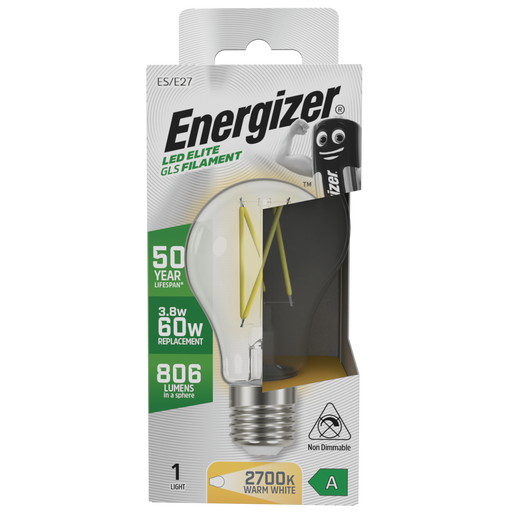
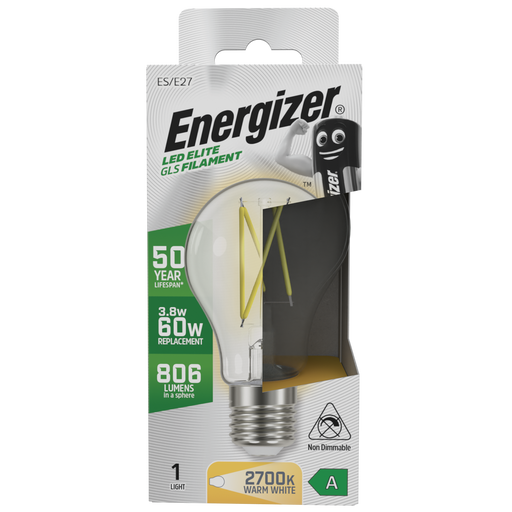
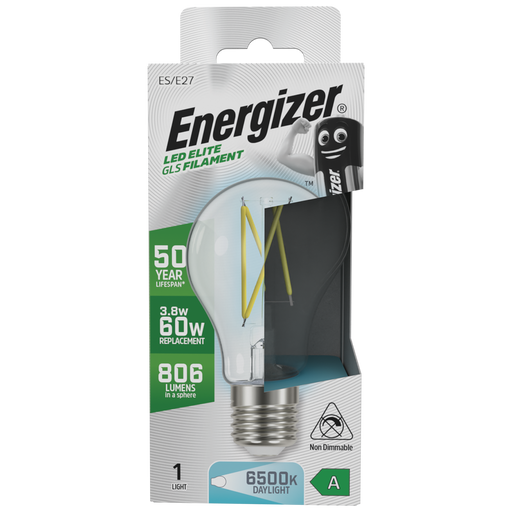

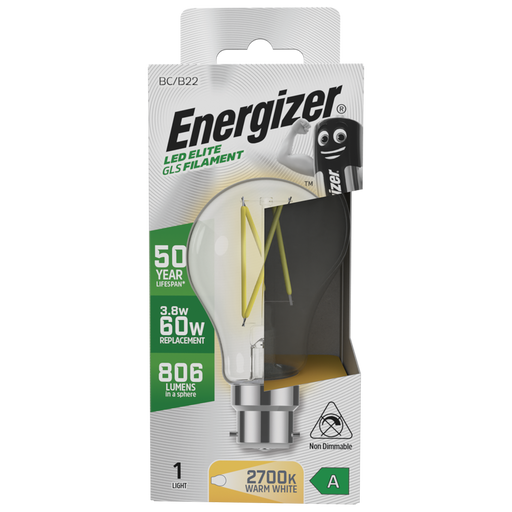

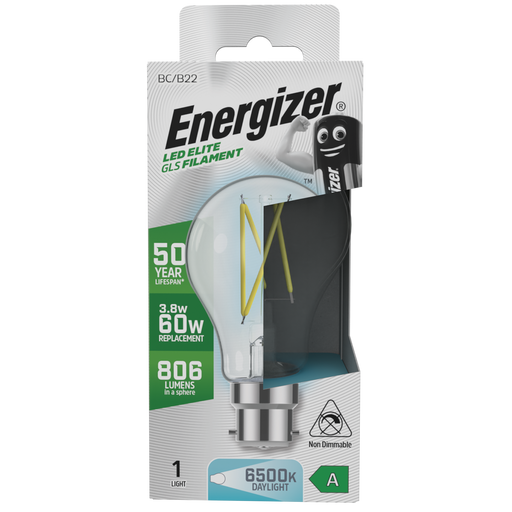

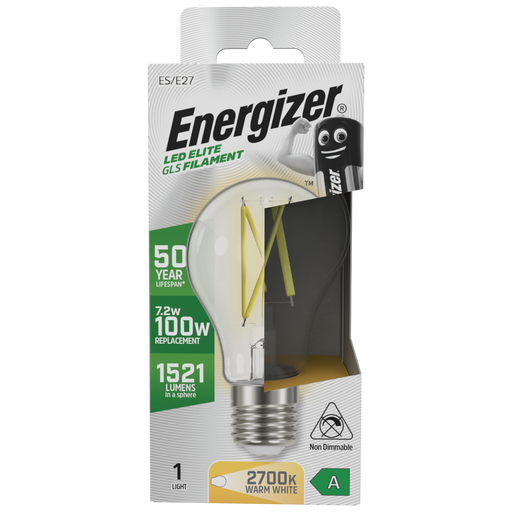

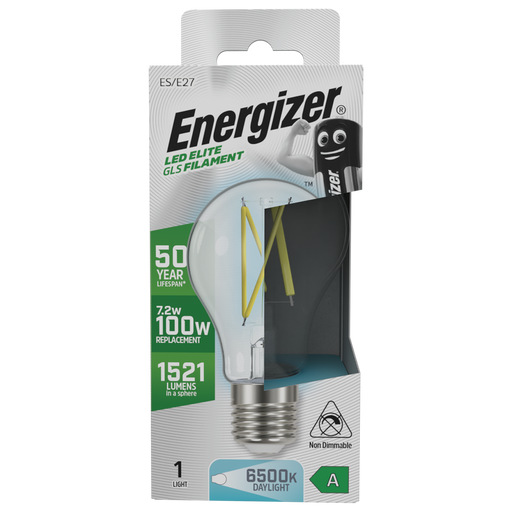

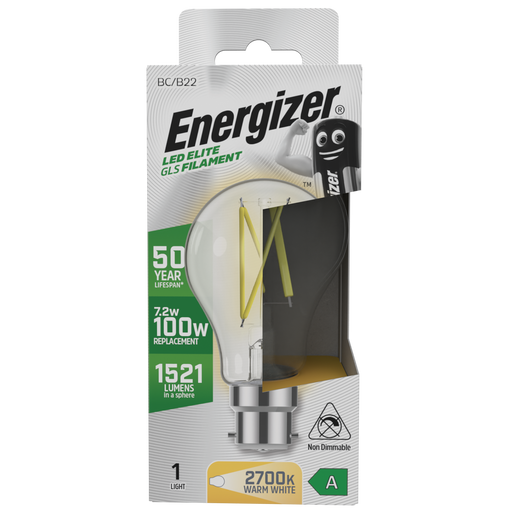
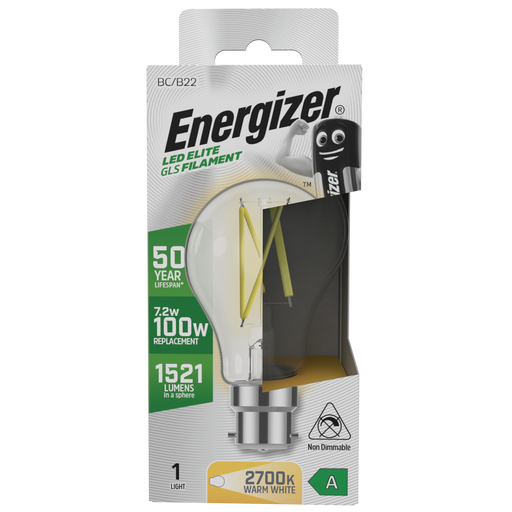
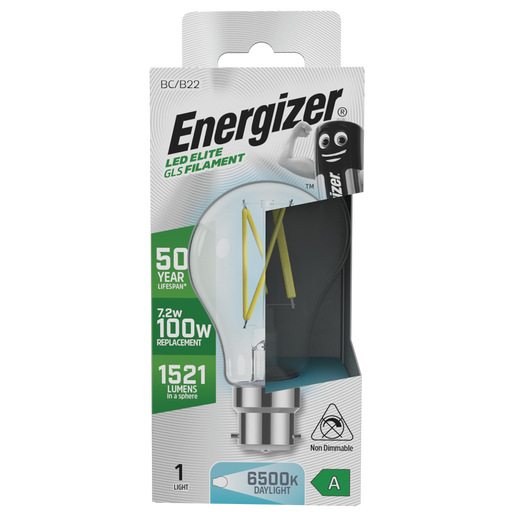
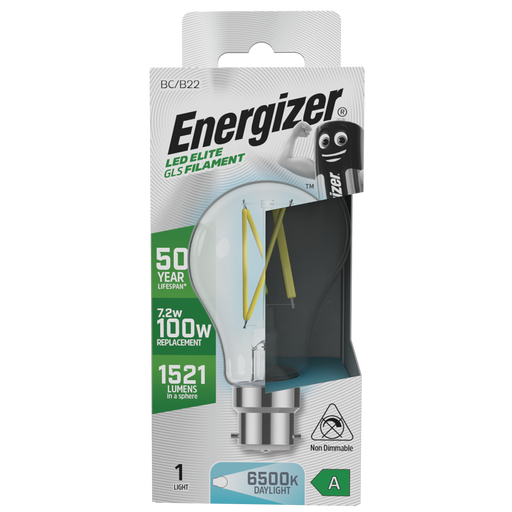
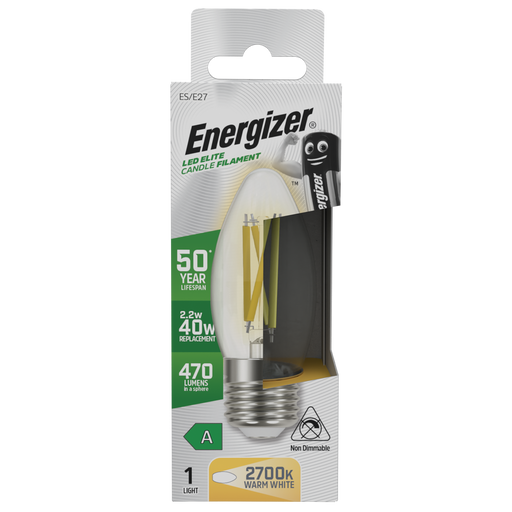
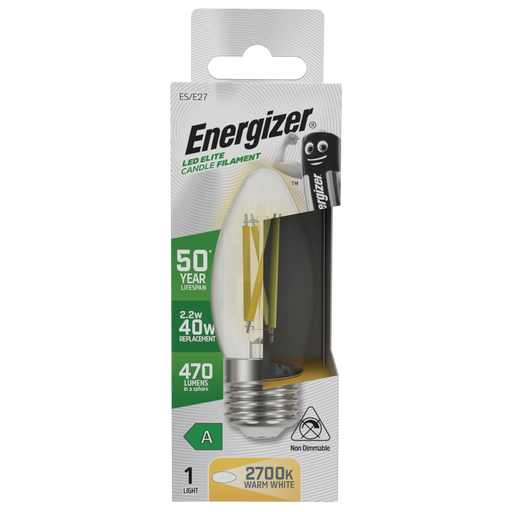
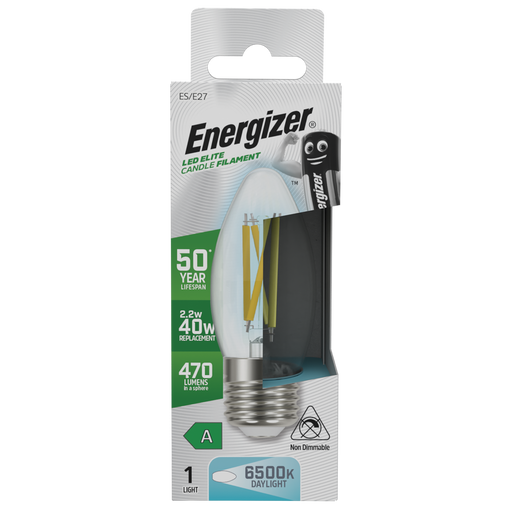
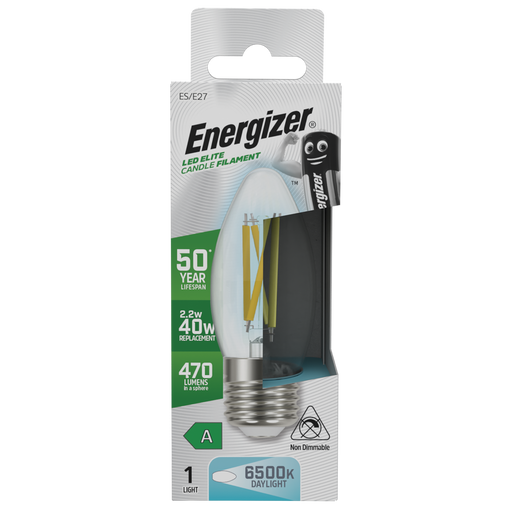
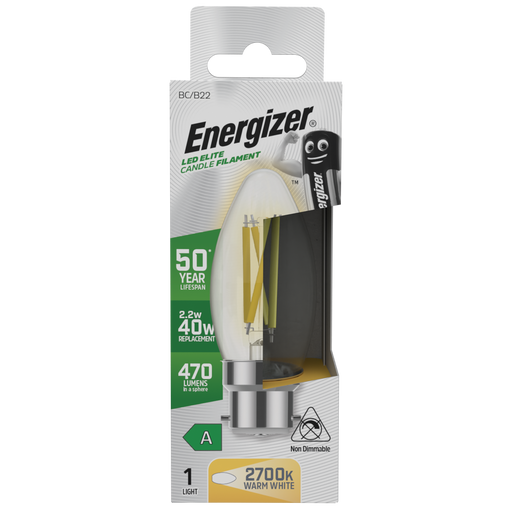
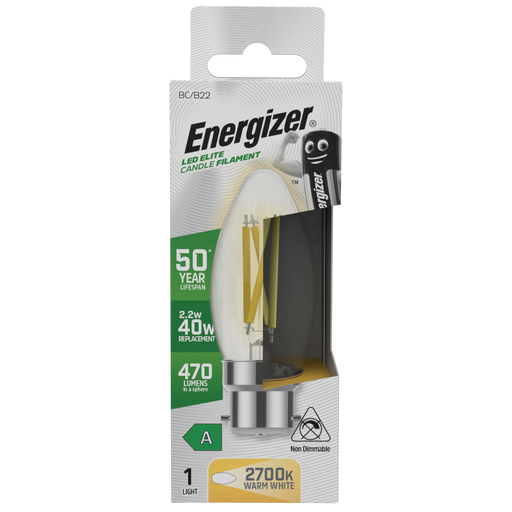
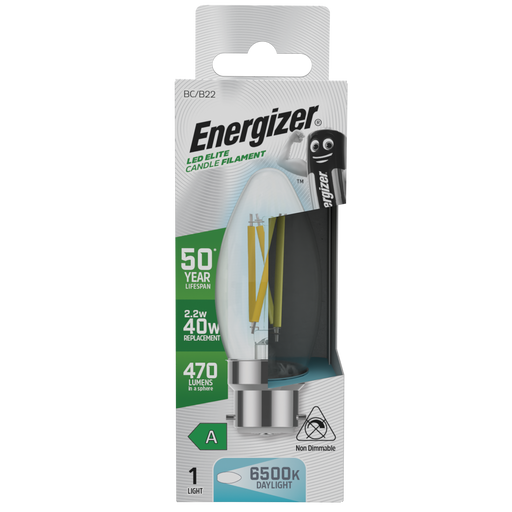
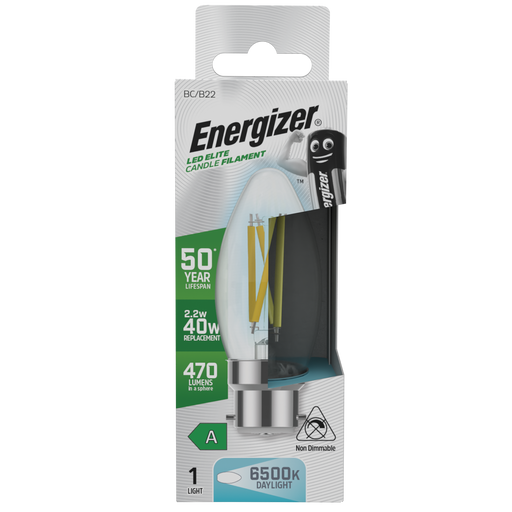
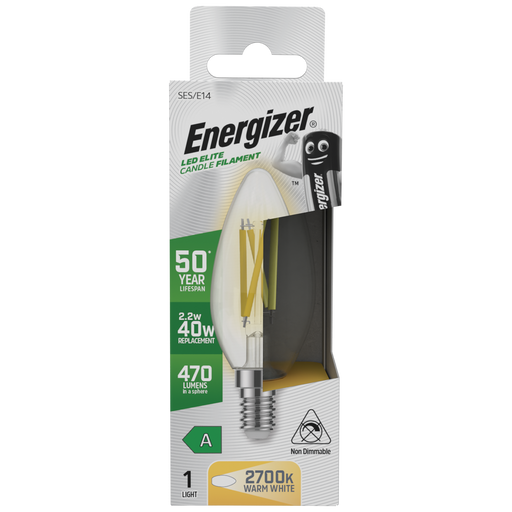
Leave a comment